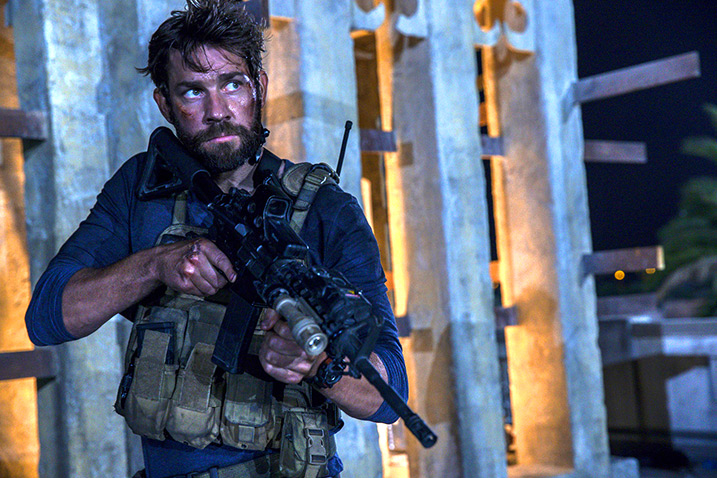
In "13 Hours," Michael Bay’s new movie about the real-life September 11, 2012 attack on two U.S. compounds in Benghazi, Libya, one super-tough CIA security contractor reads from Joseph Campbell’s "The Power of Myth." The quote doesn’t stick thanks to a plangent sound mix that prioritizes explosions over wordplay, but the title of the book is more than enough to make Bay’s point.
The director is here to raise the names of six former members of the U.S. military, two of whom were among the four Americans killed in the attacks, to the status of legend. Billed as the true story of the "secret soldiers of Benghazi," "13 Hours" is full of all the stuff that makes a Michael Bay movie: a restless leg syndrome approach to story and character, swooping cinematography, and a clear superiority of military know-how over everything else.

Paramount is positioning the military thriller as a "non-political" movie, but don’t be fooled: committing thousands of working hours and millions of dollars to tell the story of an event that dominated political discourse for months is inherently political.
Bay and screenwriter Chuck Hogan edge away from obvious targets — there’s nary a mention of Hilary and only the acronym POTUS to refer once to President Obama — but they heap derision upon the CIA and, through the character mouthpieces, spare few words for a seemingly distant administration that was woefully under-prepared for an attack in Libya. The takeaway is that systemic failure on the part of intelligence agencies, policymakers, and individual officers led to the loss of life in Benghazi.

John Krasinski and James Badge Dale lead the cast as two of the bearded and hulking six-man security force assigned to babysit an unofficial but hardly covert CIA outpost in Benghazi. Pablo Schreiber, David Denman, Dominic Fumusa, and Max Martini fill out the roster, and all do their jobs with admirably serviceable aplomb. Krasinski’s work and his slab-like abs are enough to stifle jokes about that guy from “The Office” fighting in the Middle East.
Their characters — based on real soldiers, informed by Mitchell Zuckoff‘s book — observe impatiently as an ambassador’s tour, protected by two relatively inexperienced American soldiers and a whole cadre of unreliable local forces, goes totally pear-shaped. An amorphous insurgent force attacks the ambassador’s diplomatic outpost, then the nearby CIA base. Bay spends no time on insurgent motivations, choosing to stick to the American POV. It’s among the film’s few examples of wise restraint.

But no one actor truly gets to shine as all are overwhelmed by Bay’s style. The "Transformers" movies have revealed Bay’s ever-more dramatic leanings towards military fetishism and much of this film could be intercut with footage from those Hasbro-Toy robot movies with barely a skip. Bay shoots Libya like hostile alien territory with black sand shores, skies like smears of bleak oil, and decimated urban settlements pockmarked with the husks of downed helicopters and shredded tanks.
"I feel like I’m in a fuckin’ horror movie" says one soldier, an hour after the ominous score and mounting paranoia have made that sensation more than clear to the audience. To Bay’s credit, the atmosphere is effective, and as the attack winds on into the early hours of September 12, he builds outrageous tension.

However, “13 Hours” often serves its subjects poorly, by telling their story with a muddled craft that obscures the Benghazi situation rather than clarifying. Until the focus turns to the unofficial CIA base where the bulk of the attack was focused, hyperactive and senseless editing blurs the characters and turns a simple set of locations into a twisting maze. Sorting out who’s who and where forces are in relation to one another can be an impossible task. And so “13 Hours” becomes like a foggy game of memory — based on very little information can you recall personal particulars about any one big bearded warrior?
Perhaps the intent was to replicate the chaos of Benghazi; the fact that local friends and foes were often impossible to distinguish is abundantly represented, if nothing else. (Often, this task is accomplished by dialogue that says, "We can’t tell the good guys from the bad," but we can let that pass.) The jittery editing conveys a raw anger as much as it does confusion on the ground; one wonders if "13 Hours" might ultimately be more effective if it were more clinical.

Bay reserves his purest contempt for the CIA. Agents and officers of America’s intelligence network are almost entirely useless. At best they’re distant, quiet and confused; a couple operatives are loud and inept, but attractive. The captain of the clandestine CIA outpost in Benghazi, played by David Costabile, is an evil cartoon bureaucrat: demanding, selfish, and short-sighted. He’s like Burke and Gorman — the two most irritating, damaging characters in "Aliens" — in one semi-factual personality.
Intriguingly, perhaps surprisingly so, “13 Hours” is not flatly jingoistic. From the opening history lesson about the region’s severe political destabilization to images of Libyan women and children mourning insurgents killed in the battle, Bay never stoops to a blanket demonization of anyone without an American passport. One security officer righteously tells a local CIA collaborator “your country’s gotta figure this shit out,” and it’s not outrageous to assume Bay understands the absurdity of that statement.

Persuasive on a gut level but rarely intellectually compelling, "13 Hours" is more likely to play into existing audience opinion than it is to provide any new understanding of the events that unfolded that tragic night. Bay’s overwrought tendencies simultaneously lead to the film’s most compelling sequences of tense, bloody battle even as they forestall the more nuanced storytelling that would be crucial to truly unpacking the attacks. Bay may see the film as a cry of truth; muffled by his own predilections it’s only a whisper.
[C+]

